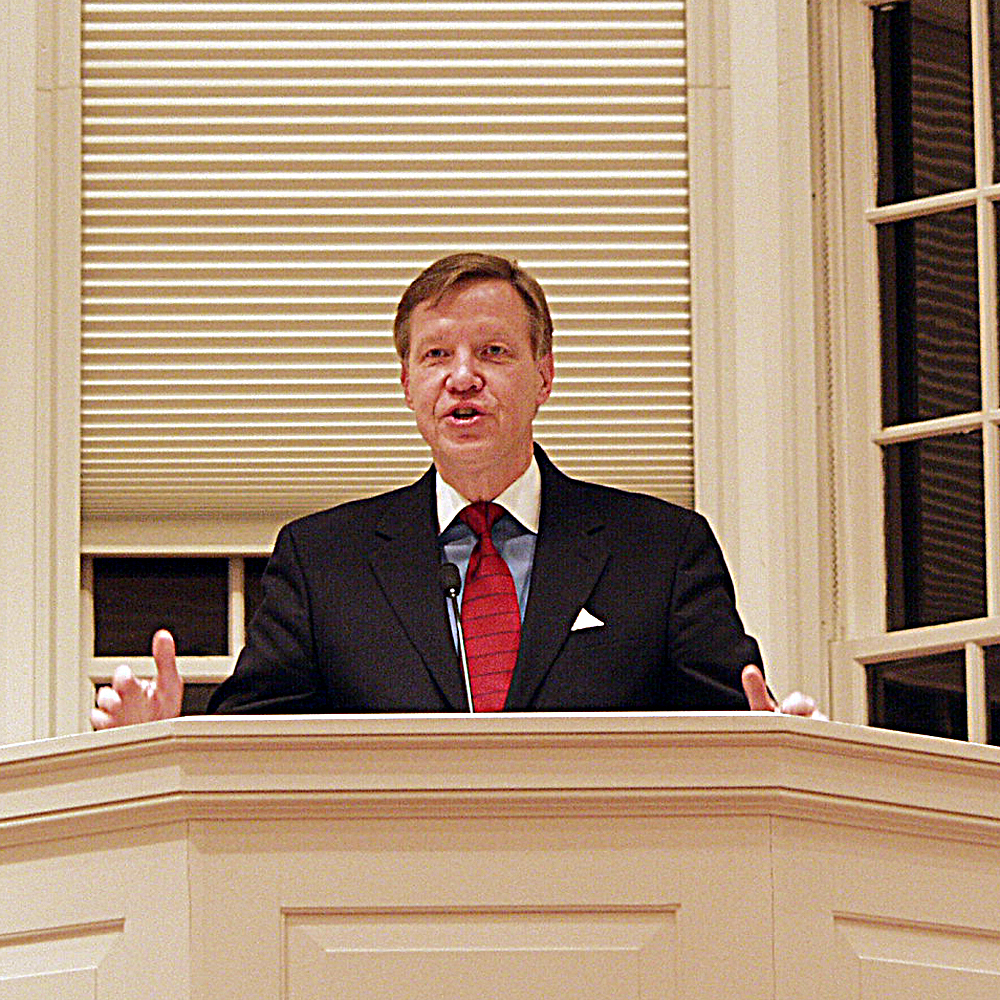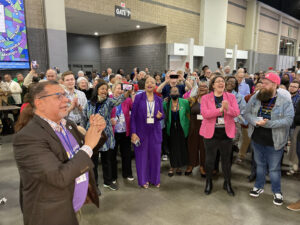
LOUISVILLE, Ky. (BP)–The United States is home to an estimated 6.5 million Muslims, 6 million Jews, 5.1 million Mormons, 1.5 million Hindus and 1.5 million Buddhists.
A mission field, Phil Roberts says, is on America’s doorstep.
The Midwestern Baptist Theological Seminary president spoke Feb. 21 at Southern Baptist Theological Seminary in Louisville, Ky., as part of the three-day “Refining Responses to New and World Religions in the 21st Century” conference. It was held by Evangelical Ministries to New Religions, a group devoted to taking the Gospel to people of all religions.
“The world is at our doorstep, and we have the opportunity to share the Gospel with people who will go back to their home countries occasionally or who may return to their home country permanently,” he said. “Here we have an opportunity to do world missions and to evangelize virtually the whole world — at least in a representative fashion.”
Roberts, speaking on the challenges of religious pluralism, said American Christians have opportunities today that they did not have a mere 40 years ago. He pointed to 1965 as a landmark year in immigration. The immigration code was rewritten, allowing for an influx of immigrants into America. The national origins quota system was abolished, meaning that more people from such places as Asia could immigrate to the U.S.
Roberts quoted 2000 census data that documented in the 1990s, the Hispanic population increased by 48 percent and the Asian population by 40 percent.
He said the census data “gives us an impression about how immigration has impacted this nation. Of course, when these people come — wherever they come from — they bring rightfully their religions with them.”
Roberts told the story of how he recently met a Muslim college student while traveling. The man was from Saudi Arabia, and Roberts was able to share the Gospel with him.
“I’ve been able to visit with him, give him a copy of the Bible in Arabic and give him a Jesus video and to have several meaningful visits with him,” Roberts said.
He said two kinds of pluralism exist. One is practical pluralism, which is the proliferation of religions in America. While that type of pluralism can be embraced by Christians — simply because of the abundance of missions opportunities — a second type of pluralism, philosophical pluralism, must be rejected, Roberts said. Philosophical pluralism involves the concept that all religions offer a path to God. In other words, all religions are equal.
And Americans are embracing that belief. Roberts quoted statistics from researcher George Barna, who in his latest survey found that only 22 percent of Americans believe in the existence of moral absolute truth [the belief that morality does not change].
Roberts gave several prominent examples of philosophical religious pluralism.
One is Great Britain’s Prince Charles, who has said that upon becoming king he wants to be referred to as “Defender of Faith” — and not “Defender of the Faith,” as is currently used. The traditional title, used for centuries, refers to the monarch’s role as head of the Church of England. The new title, Charles said, would be more inclusive.
Another example, Roberts said, is columnist Thomas Friedman of the New York Times. Last year Friedman wrote that the real war is not between the world and terrorism, but rather between pluralism and religious totalitarianism, which he described as “a view of the world that my faith must reign supreme and can be affirmed and held passionately only if all others are negated. That’s bin Ladenism.”
Friedman wrote that some Jews and Christians “have gone back to their sacred texts to reinterpret their traditions to embrace modernity and pluralism, and to create space for secularism and alternative faiths. Others — Christian and Jewish fundamentalists — have rejected this notion, and that is what the battle is about within their faiths.”
Friedman’s idea of pluralism must be rejected, Roberts said.
“Here’s a man who has obviously taken 9-11 and turned it on its head,” Roberts said. “He says the real villain out there is not a form of Islam or even an extreme form of Islam. … Rather, he says the problem is not with a particular religion, but it is with all religions that claim an exclusivist position.”
The target in Friedman’s “real war” becomes “those that we know as evangelicals. In others words, you and I,” Roberts said.
Christians, Roberts argued, should be prepared to respond to such attacks. He pointed to 2 Timothy 1:7 as a model for response: “For God has not given us a spirit of fear, but of power and of love and of a sound mind” (NKJV).
Roberts listed four aspects to a Christians’ response. They should be informed, answer with a sound mind, be filled with love and be filled with power.
“We need to stand ready to give a reason for why we believe in exclusivism, (and that) faith and trust in Jesus Christ and Jesus alone is necessary for salvation,” Roberts said. “Let’s not be intimidated. Rather, let’s be prepared to respond to it.
“We need to be prepared — both in our wit and wisdom — to give a response.”
Roberts said that the Christian church has turned the tide in the past. He pointed to the fourth century, when the church father Athanasius led the charge in rejecting Arianism — which is the belief that Jesus was created by the Father.
Secondly, Christians must have a sound mind. Roberts noted that the Christian faith spread in first-century Greece, which was a pluralistic society with many religions.
“(Early Christians) were quite willing to pay the ultimate price to see that the Gospel is heard. We need to explain what salvation is all about. It’s not a matter of having the right orientation. It’s not a matter or being catechized or baptized in the right dimension … It’s a matter of having our faith and trust in Jesus Christ.”
However, a Christian must be filled with love.
“That is possible, of course, only through the Holy Spirit,” Roberts said.
He warned against “how easily it is to slip into combativeness, and how the element of love and genuine concern about those who need the Gospel can often times be lost in the process.”
Finally, a Christian must be filled with the power of the Spirit.
“Our ministries cannot be driven by popular opinion or the gospel of the Gallup poll,” Roberts said. “Let’s remind ourselves that the pluralists are not our enemies; the Muslims aren’t either. They are our field; they are our parish. They wait to hear the Good News.”
For more information on Evangelical Ministries to New Religions, visit www.emnr.org
–30–
(BP) photo posted in the BP Photo Library at http://www.bpnews.net. Photo title: ROBERTS SPEAKS AT SOUTHERN.
















